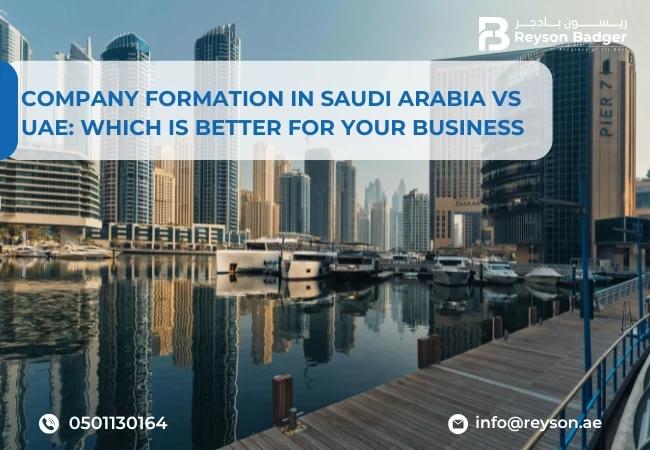Company Formation in Saudi Arabia vs UAE: Which is Better for Your Business?
Written By Akshaya Ashok, Reviewed By Retheesh R S
Published on 30/11/2024

KSA and UAE, located geographically in a central part of the Middle East, are gradually turning into promising business environments with necessary revolutionary changes in an economic model and investment initiatives. The more these two cities pull in international commerce, talent, and capital the world over, the more there is a need to get it right by selecting the right country to register a company. Since the legal systems, tax laws, and licensing policies of the two countries are distinct, any opportunity or challenge that Saudi Arabia presents will have a different manifestation in the UAE. Since this is a detailed comparison of Saudi Arabia and UAE company formation, it provides businesses with the necessary information they require for business in these dynamic markets, helping businesses get the best out of their operations.
Overview of Company Formation in Saudi Arabia
Types of Business Entities
In Saudi Arabia, there exist different business structures for both local and foreign investors, such as:
Limited Liability Company (LLC):
- A favorite for many business owners, while its shareholders are protected from potential liabilities in a limited way.
- Minimum of 1 shareholder up to a maximum of 50.
Joint Stock Company (JSC):
- Ideal for large businesses, as shares can be traded publically.
- At least two shareholders are required, but three directors.
Sole Proprietorship:
- Owned by a single person who bears full liability for the venture.
- Common among small firms and freelancers.
Partnership:
- Comprise of general, limited, and sleeping partners whereby ownership is shared together with the responsibilities as well.
Branch Office:
- It refers to an extension of a foreign company that operates in Saudi Arabia and is not a legal entity.
Representative Office:
- These are usually provided by foreign companies to primarily market their services and not carry out direct sales.
Requirements for Registration
Registration entails all the critical following steps:
- Saudi Arabian General Investment Authority (SAGIA): Foreign investors must acquire an investment license from the SAGIA to gain a legal foothold in the Kingdom. This includes an application detailing the business plan and investment strategy.
- Ministry of Commerce and Industry (MOCI): Upon gaining SAGIA clearance, businesses will have to register with MOCI. This includes the selection of a unique trade name and drafting the Articles of Association.
Licensing and Permits
Depending on the nature of the business, other licenses may be needed:
- Commercial License: Generally needed for nearly all kinds of commercial activities.
- Special Licenses: Some industries, such as healthcare and education, demand special permission from various authorities
Minimum Capital Requirements
The minimum capital requirement differs according to the type of company:
- LLC: The LLC often comes with the legally required minimum capital of around SAR 100,000, which is equivalent to approximately USD 27,000.
- JSC: To obtain the JSC license, one has to have at least a minimum capital of 500 000 SAR.
- Sole Proprietorships and Partnerships: Usually the subscribe businesses have no specific fixed capital needs but in some cases may be required to show adequate financial resources.
Overview of Company Formation in UAE
Types of Business Entities
The UAE offers several types of business structures suitable for local and foreign investors:
Limited Liability Company (LLC):
- The structure most favored by foreign investors enables 100% foreign investment in some instances.
- It is required to have at least two but no more than fifty shareholders.
Free Zone Company:
- Established within designated free zones offering benefits like tax exemptions and full foreign ownership.
- Companies can operate within the free zone or internationally but may face restrictions on doing business directly in the UAE mainland without additional licenses.
Joint Stock Company (JSC):
- Suitable for larger businesses with publicly traded shares.
- Mandates the presence of one shareholder and a minimum capital contribution.
Sole Establishment:
Owned by a single individual with full control but limited to specific professional activities.
Branch Office:
A branch of a foreign company that can conduct commercial activities in the UAE.
Representative Office:
Primarily used for marketing purposes without direct sales capabilities.
The registration process includes:
- Department of Economic Development (DED): For companies operating in mainland areas, registration with DED is necessary to obtain a commercial license.
- Free Zone Authorities: For businesses set up in free zones, registration is handled by the respective free zone authority, which has its own set of rules and procedures.
Licensing and Permits
Businesses must secure various licenses depending on their activities:
- Commercial License: Required for trading activities.
- Professional License: Needed for service-based businesses.
- Industrial License: Required for manufacturing operations.
Minimum Capital Requirements
Minimum capital requirements differ based on the business structure:
- Limited Liability Company (LLC): This requires a minimum capital amount set by the DED or relevant free zone authority; this can vary but often starts around AED 300,000 (approximately USD 81,600) in some emirates.
- Joint Stock Company (JSC): It requires a minimum capital investment of AED 10 million (approximately USD 2.7 million) for public companies.
Saudi Arabia Vs UAE
| Features |
Saudi Arabia |
UAE |
|
Business Structure and Ownership Requirements
|
- Requires a minimum of 25% local ownership for limited liability companies (LLCs)
- Requires a minimum capital for LLCs, ranging from SAR 100,000 to SAR 500,000.
|
- 100% foreign ownership in free zones
- Different types of business setups that offer flexibility, such as sole proprietorships and civil companies.
|
|
Taxation and VAT Regulations
|
- Impose a 15% VAT rate
- Comprehensive tax system, including corporate income tax (CIT) and withholding tax (WHT).
|
- Impose a 15% VAT rate
- Lenient tax environment, with no CIT or WHT for most businesses.
- Offers tax exemptions for businesses operating in free zones.
|
|
Labor Laws and Employment Requirements
|
- The Nitaqat program requires companies to meet specific localization targets
- Stricter regulations regarding employee sponsorship and transfer
|
- The Emiratization policy encourages hiring local nationals.
- Offers more flexible employment arrangements, including part-time and flexible work permits.
|
|
Regulatory Frameworks and Compliance
|
- The regulatory environment is more complex, with multiple government agencies overseeing business operations.
- Compliance requirements require more extensive documentation and reporting.
|
- It has a more streamlined regulatory framework, focusing on free zone authorities
|
Factors to Consider
Business Activity and Industry
When evaluating business structures in Saudi Arabia, consider specific industries or business activities. Some sectors require specialized licenses and regulatory approvals; examples include finance, healthcare, and energy. Select a structure that aligns with these industry-specific requirements and regulations. For example, businesses in regulated sectors might be directed to joint stock companies or partnerships with a local investor.
Market Access and Target Audience
Choose a business structure based on an assessment of the target market and base of customers. This can include market size, competition, and consumer preferences. Some businesses, for instance, will target government contracts and require local partnerships or joint ventures, while others have consumers as targets with a preference for structures offering flexible ownership arrangements.
Cost and Feasibility
Analyse the cost and running costs of any one business structure. Take into account registration fees, minimum capital requirements, and run-on expenses. All these determinants should be compatible with your budget and the strategy of the business. Then analyze the feasibility of setting up the structure with the maintenance of such structure, considering regulatory compliance and other administrative requirements.
Language and Cultural Considerations
Language and cultural background are significantly important aspects of the business environment of Saudi Arabia. For example, think about language skill demands in doing business, communication with governmental agencies, or even a client's expectations. Finally, learn the local customs and corporate etiquette to find successful collaboration partners, customers, and employees. Structures with local partners or joint ventures are good sources of cultural insights and navigation skills.
Industry-Specific Considerations
| Industry |
Saudi Arabia |
UAE |
Regulations/Issues |
|
Oil and Gas
|
Partnership with Aramco, Petroleum and Mineral Resources Law
|
Partnership with ADNOC, Petroleum Law |
Local content requirements, environmental standards |
|
Finance and Banking
|
SAMA regulations, licensing requirements
|
Central Bank regulations, licensing requirements
|
Capital adequacy ratios, anti-money laundering |
|
Health Care
|
Health regulations, licensing requirements by the Ministry of Health
|
Health regulations, licensing requirements by the Ministry of Health and Prevention
|
Medical personnel, health insurance requirements
|
|
Technology and Innovation
|
SAGIA initiatives, funding that is innovation-centric
|
Business of new ideas; Ministry of Economy initiatives with a focus on innovation; funding, innovation competence; data protection, intellectual property rights.
|
|
Free Zones: A Comparative Analysis
| Country |
Free zones |
Features |
Disadvantages |
| Saudi Arabia |
- King Abdullah Economic City (KAEC)
- Jazan Economic City
- King Abdullah Financial District
- Saudi Arabia's Industrial Cities
|
- 100% foreign ownership
- Tax exemptions
- Streamlined regulations
- Access to major ports and logistics hubs
- Specialise more in industrial and logistics development
- Attractive to the business location of the industrial and manufacturing business sectors.
|
- Fewer free zones
- More strict conditions in regulatory aspects
|
| UAE |
- Dubai Free Zone
- Abu Dhabi Free Zone
- Dubai Silicon Oasis
- Ras Al Khaimah Free Trade Zone
|
- 100% foreign ownership
- Exemptions from taxes
- Flexible regulatory environment
- Accessibility to major airports and seaports
- Target a wider range of industries
- Offer much flexibility in ownership as well as regulation
|
- Higher setup and operating cost
- Higher regulatory system complexity
|
Conclusion
The choice between Saudi Arabia and UAE depends on the individual needs and objectives of your business. With regard to industry-specific regulations, ownership requirements, taxation, and labor laws, you will be making an informed choice. At Reyson Badger, we specialize in company formation services and can offer the best guidance on Setting up and maintaining a business in both Saudi Arabia and the UAE. Reyson Badger is one of the best Middle East business setup experts. Are you prepared to develop your business in the Middle East? Contact us immediately to set up a consultation and let our experts assist you with the process. Develop your business in the Middle East with Reyson Badger. set up a consultation and let our experts assist you with the process.

Written By
Akshaya Ashok
Akshaya Ashok is a content writer specializing in creating content focused on accounting and auditing. With over two years of experience, she has developed expertise in crafting professional content for the financial sector.

